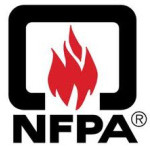- 産業: Fire safety
- Number of terms: 98780
- Number of blossaries: 0
- Company Profile:
Established in 1896, NFPA's mission is to reduce the worldwide burden of fire and other hazards on the quality of life by providing and advocating consensus codes and standards, research, training, and education.
A collection of characteristics such as weather, altitude, and terrain contained in an area that are unique to a location.
Industry:Fire safety
A code or standard that prescribes fire safety for a generic use or application.
Industry:Fire safety
A coating that reduces the flame spread to greater than 25 but not more than 75, and that has a smoke developed rating not exceeding 200 where applied to the applicable substrate, building material, or species of wood when tested in accordance with NFPA 255, ASTM E 84, or UL 723.
Industry:Fire safety
A coating that reduces the flame spread to 25 or less, and that has a smoke developed rating not exceeding 200 where applied to the applicable substrate, building material, or species of wood when tested in accordance with NFPA 255, ASTM E 84, or UL 723.
Industry:Fire safety
A coating that reduces the flame spread of Douglas fir, and all other tested combustible surfaces to which it is applied, by at least 50 percent or to a flame spread classification value of 75 or less, whichever is the lesser value, and has a smoke developed rating not exceeding 200 when tested in accordance with NFPA 255, ASTM E 84, or UL 723.
Industry:Fire safety
A close-fitting damper to prevent flow and minimize leakage of air or flue gas into any system component.
Industry:Fire safety
A closed-loop stability-control system that relies on proven antilock brake system and traction control system components. It incorporates sensors for determining vehicle parameters as well as an electronic control unit to modulate braking and traction forces.
Industry:Fire safety
A closed vessel in which water is heated, steam is generated, or steam is superheated, or in which any combination thereof takes place by the application of heat from combustible fuels, in a self-contained or attached furnace.
Industry:Fire safety
A closed system consisting of loading stations with inner doors and a fire-rated, normally locked, outer (intake) door; normally closed air damper above the topmost loading station; transport piping, both vertical and horizontal; waste or linen collector; fan with a fan damper; and a central process controller.
Industry:Fire safety
A closed combustion pellet vent or chimney-connected solid pellet fuel-burning appliance incorporating a fuel-feed control mechanism.
Industry:Fire safety
